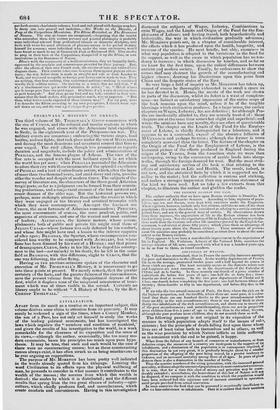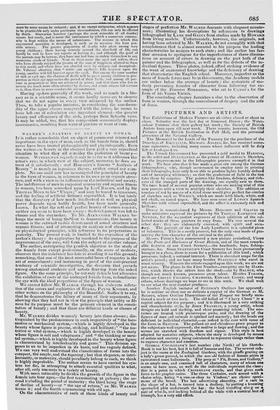CIVILIZATION.
APART from its merit as a treatise on an important subject, this volume derives some claim to attention from its paternity. It may surely be reckoned a sign of the times, when a County Member, the son of a Peer, has not only set himself to study the works of the leading political economists, but has investigated the laws which regulate the " numbers and condition of tnankind," and given the results of his investigation to the world, in a work remarkable for the clearness of its exposition and the sense of its views,—although the author, occasionally, like too many mo- dern economists, bases his principles too much upon pure hypo- thesis. It may be true, that such and such would be the case if there were no counteracting causes; but as these counteracting causes always exist, it has often struck us as being mischievous to be ever arguing on suppositions. The purpose of Mr. MORETON has been pretty well indicated in the words already quoted from his titlepage. Limiting the word Civilization to its effects upon the physical wellbeing of man, he proceeds to consider in what manner it contributes to the wealth of the masses; the sources from which this wealth is derived ; the modes by which it is distributed ; and the different results that spring from the two great classes of industry—agri- culture, which chiefly produces food, and manufactures, which create comforts and conveniences. Having in this investigation discussed the subjects of Wages, Industry, Combinations to raise Wages, and the Limits and Origin of the Fund for the Em- ployment of Labour; and having traced, both hypothetically and historically, the way in which civilization gradually advances; Mr. MORETON points out, in a chapter of considerable interest, the effects which it has produced upon the health, longevity, and increase of the species. He next briefly, but ably, examines in what way population is adapted to the variations in the fund for its support, as well as the cases in which population has no ten- dency to increase; in which discussion he touches, and so far as we know for the first time, upon the radical differences between ancient and modern society. Finally, he endeavours to show the causes that may obstruct the growth of the manufacturing and higher classes; drawing his illustrations upon this point from China and the despotic states of the East. So very large a field of inquiry as Mr. MORETON has taken up, cannot of course be thoroughly exhausted in so small a space as he has devoted to it. Hence, the merits of the work are shown in parts of the discussion, whilst its defect is a want of complete- ness—no distinct or satisfactory impression of the entire scope of the book remains upon the mind, unless it be of the tangible blessings which civilization produces. In a large Sense, the earlier chapters on Wages, Industry, &c. are defective ; for although Pro- fits are incidentally alluded to, they are scarcely treated of : these chapters are at the same time somewhat slight and superficial; and where the opinions have any novelty, they are often of questionable truth. The chapter on the Limits of the Fund for the Employ- ment of Labour, is chiefly distinguished for a laborious, and it appears to. us a successful, exposi: of the absentee fallacies of M'Cut.i.ocit and perhaps SENIOR; although the former is more completely answered than the latter. The feature of the chapter on the Origin of the Fund for the Employment of Labour, is the historical picture of the effects produced in England during the reigns of the TUDORS, from the transition state we were then undergoing, owing to the conversion of arable lands into sheep. walks, through the foreign demand for wool. But the most strik- ing and satisfactory- section of the book is that relating to the effects of civilization on Life and Health. The result, indeed, is not new, and the statistical facts by which it is supported are fa- miliar to the statist; but the collection is curious and striking, and makes a stronger impression than any previous statement of the kind we have read. Let us take a few extracts from this chapter, to illustrate the author and gladden the reader.
TILE PRESENT AGAINST THE PAST.
The earliest authority that we have upon Roman statistics is Domitius Lit-- pianos, minister of Alexander Seven's. According to him, registers of point- age, sex, and disease, were kept with exactness under the Emperors. These registers, however, include only free citizens, and take no note of the slave population ; they must, therefore, be considered as relating to a certain extent to picked lives, and not to the general mass of society. By observations drawn from these registers, the expectation of life to the Roman citizens has been fixed at thirty years. Now the expectation of life in England, according to calcula- tions tnatle from the tontines and other life annuities granted by the English Go. vernment, is calculated at above fifty years ; which gives them an advantage of above twenty years above the Roman citizens. These nominees of govern. went life annuities may probably be considered as select lives to about the same extent as the Roman citizens.
There appears to have been a considerable improvement in the expectation of life in England. Mr. Finlaison, Actuary of the National Debt, considers the average duration of life now, compared with what it was a hundred years ago, to be as four to three, in round numbers.
ADVANTAGE OF WEALTH.
M. Villerm4 has ascertained, that in France the mortality increases amongst the poor and diminishes to the affluent. In the wealthy departments of France, life is, on the average, protracted twelve years and a half beyond its course in those which are poor. The least mortality occurs in the districts where ease and happiness are most common, as in the departments of the Calvados de l'Orrne and de la Sarthe. In these scarcely one-fourth of a given number of individuals die before five years of age ; one-half die at forty-five ; three. fourths are dead at seventy. In the two poor departments of l'Indre and le Cher, one-fourth before completing the first year; one-half between fifteen and twenty ; three-fourths at fifty in one department, and before fifty-five in the other.
If we take the two arrondissements of Paris, the first, where the rich are in the highest proportion, and the twelfth, where there are most poor, it is calcu- lated that there are one hundred deaths in the poor arrondissement where there are fifty in the rich arrondissement; there is one annual birth to above thirty-two inhabitants of the rich arrondissement, and above one to twenty-six of the poor arrondissement ; and, notwithstanding, there are not in proportion more children from 0 to 5 years of age in the one than in the other, because, although the poor produce more children, they do not nourish them so well. The following passage is not original in its exposition of the manner in which population adapts itself to the means of sub ts sistence; but the principle of death failing first upon those whose lives are of least value both to themselves and to others, as well as the wise provision by which Nature inflicts as little suffering as is consistent with the end to be gained, is happy. When from the failure of any branch of commerce or manufactures, or from defective crops, the resources of a country are inadequate to the support of its inhabitants, and a diminution of the population is in consequence required, if this diminution be not very great, it is gradually brought about by a smaller proportion of the offspring of the poor being reared, by a greater tendency to sickness, and an increased mortality among those of all ages. In years uf great distress there is also a diminution in the number of births. Thus the scantier numbers of the rising generation, with the increased general mortality, will soon adapt the amount ofpopulation to its more contracted resources. It is true, that for u time this class of misery and privation may be consi- derably extended ; nevertheless, the benevolence of this law of Nature will not be disputed, if we compare it with the condition to which the population would have been reduced had this injurious rate of increase continued in operatiOrt until people perished from actual starvation. In some countries the food that can be procured is occasionally insufficient to affor to bare subsistence to inhabitants. Here it is evident that their numbers want by some means Ire reduced ; and, if we except emigration, which appears to be practicable only under particular circumstances, this can only be effected by death. Starvation however (perhaps the most miserable of all deaths) occurs but rarely, and is never the instrument by which a numerous commu- nity is kept within the means of subsistence. The manner in which this augmented mortality is developed, is such as to occasion the least pos- sible misery. The greater prop-lawn of deaths take place among very young children ; these having scarcely crossed the threshold of We., can. hardly be said to have any regrets at leaving ; and although the grief of the parents may be intense, they have not had time to endear themselves to any numerous circle of friends. Next to these come the aged and infirm, those who have already enjoyed the greater of the sum of happiness allotted to them in this world, and whose lives are clouded over by sickness and decrepitude. Dr. Valeria, observes, that " while one epidemic fills heaviest upon the young, another will fall heaviest upon the aged. lint among the same number of sick at each age, the chances of death will be grert among, children in pro- portion as their age approaches the period of their birth, and among all per- sons in proportion as they are advanced in years; and that those who live in misery are much more often attacked by disease, and much oftener fall victims to it, than those in more comfortable circumstances.
Having spoken generally of the work, and as much in a lite- rary as in a scientific sense, it seems hardly neces-ary to observe that we do not agree in every view advanced by the author. Thus, to take a popular instance, in considering the non-fecun- Ility of the upper classes compared with the lower, he seems to have left out of calculation one important element—the greater luxury and effeminacy of the rich, perhaps their Sybarite vices. It may be added, too, that his composition occasionally displays inaccuracies, resulting from want of practice or want of care.



























 Previous page
Previous page